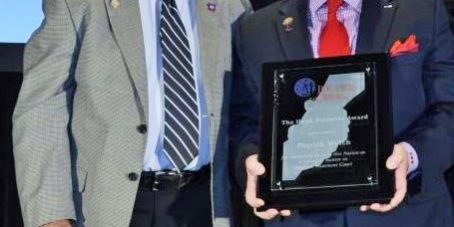PRESS RELEASE
Event Date: April 9-10, 2015
Contact: Ed Junod
ejunod@tnvhc.org
865-336-2624
‘LEAVE NO VETERAN BEHIND’ IS MISSION OF VETERAN TREATMENT COURTS AND MENTORS
“I’ve got your back.” It’s the promise of one soldier to another, and returning home from combat doesn’t change that commitment. Too see the depths of such loyalty, you need only spend an afternoon in a Veterans Treatment Court (VTC), where volunteer veteran mentors encourage and assist other veterans faced with legal challenges.
Ed Junod, a Vietnam veteran and chairman of the Knoxville Regional Veterans Mental Health Council, said veteran treatment courts are the best way to address justice for veterans. Not just because they are more rehabilitative than punitive, but because they work. He’s hoping to persuade the community, judges and law enforcement personnel to take into account those concerns exclusive to veterans.
On April 9-10, the council will offer an orientation program at the Knoxville – Knox County Community Action Committee (CAC) Building in Knoxville to gauge the interest of prospective veteran mentors from some 17 Tennessee counties. Judges, district attorneys, court directors and law enforcement from six judicial districts around the state will also be on hand to learn just how treatment courts are developed and why they are successful.
For many veterans, transitioning from military to civilian life can be fraught with battles as injurious (if not more so) as those faced during their service. Soldiers returning home deal with relationship problems, addiction, homelessness, joblessness, and even criminal charges. Volunteer mentors ensure that every participating Veteran receives the services they require by helping them navigate the system and to act as a mentor, advocate, and ally.
Patrick Welch, a Vietnam veteran and member of the country’s first VTC in Buffalo, New York, told a House Veterans Affairs Committee such mentors are a key element in ensuring the success of justice involved veterans. The military-like support system of mentors, he said, provides veterans with the backing they may have lacked when initially coming home.
Welch, along with fellow Vietnam vet and co-founder of the Buffalo VTC John O’Connor, will speak at the Knoxville orientation program. While the upcoming April 9-10 session is now full, other training sessions can be provided upon request. Veterans interested in becoming a VTC mentor should contact Junod at ejunod@tnvhc.org.
The Knoxville Regional Veterans Mental Health Council is a volunteer organization founded to ensure soldiers coming home have access to the support, care and benefits they have earned.
###







I had my share of problems with the va and active duty but I really would like to help vets because I believe no soldiers should be left behind for any reason